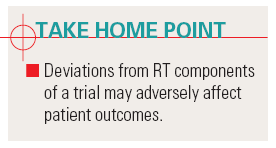Revamped quality assurance approach embarks on a new era in clinical trials
BOSTON-It’s no secret that quality assurance is essential for ensuring the accuracy of clinical trials. But the potential for real-time intervention also gives modern-era QA an unprecedented ability to improve outcomes, according to research presented at the ASTRO 2008 meeting (abstract 2576).
ABSTRACT: Deviation rates identified in real-time program show profound statistical effect during studies by providing feedback to investigators, allowing for ongoing corrections.
BOSTON-It’s no secret that quality assurance is essential for ensuring the accuracy of clinical

trials. But the potential for real-time intervention also gives modern-era QA an unprecedented ability to improve outcomes, according to research presented at the ASTRO 2008 meeting (abstract 2576).
In a poster presentation, investigators from the Quality Assurance Review Center (QARC) at the University of Massachusetts Medical School cited two examples of how deviations from the radiation therapy (RT) components of a trial protocol adversely affected patient outcomes.
The QARC program, which currently provides QA services to six cooperative groups conducting National Cancer Institute-supported clinical trials, requires investigators to provide RT and imaging data for each patient as early as possible in the treatment process.
QARC reviewers then rapidly assess therapeutic response, identify any protocol deviations, and provide feedback to investigators so that those deviations can be addressed before the patient moves any further through the trial process.
“We’ve developed a variety of digital pro forma so that institutions from anywhere around the world can send us data. Those elements have really changed the nature of QA,” said Thomas J. FitzGerald, MD, chair of radiation oncology at UMass and principal investigator at QARC, which is based in Providence, Rhode Island. “It used to be that QA wouldn’t necessarily influence a clinical trial because compliance was assessed only in retrospect. When response validation is done in real-time, you’re not paralyzed by the deviation.”
Deviations had a significant effect on patient outcomes in the early stages of a trial assessing the potential value of supplementing chemotherapy with RT in treatment of pediatric Hodgkin’s disease that was ultimately published in the Journal of Clinical Oncology (15:2769-2779, 1997).
Retrospective QA revealed a deviation rate of 30%, Dr. FitzGerald said, which adversely affected 5-year relapse free survival rates in the combination therapy group (96% in those treated appropriately vs 86% in those with deviations).
Interventional QA that was introduced in the next generation of studies decreased the deviation rate to less than 10%. However, retrospective review of imaging data revealed a 50% discordance between central reviewers’ and institutions’ investigators assessment of response.
Dr. FitzGerald suggested that the discordance may have contributed to the absence of additive therapeutic effect seen in the trial.
Subsequent studies in Hodgkins now utilize real-time review of images as well as RT in order to ensure that patients are managed on the study appropriately, he said; deviation rates are currently around 3%.

In a trial of the chemotherapeutic agent tirapazamine (SR-4233), 96 of 205 deviations from RT protocol were associated with an adverse effect on outcome. Although tirapazamine did not improve 4-year survival outcomes, cases in which deviations were identified by QARC but not corrected had survival rates about 20% lower than the rest of the study population (ASCO 2008 abstract LBA6008). “Radiation therapy was not the randomization point-that trial was designed to test the chemo agent-but the deviation rates showed a profound statistical effect,” Dr. FitzGerald said. “In my mind, that’s one of the most powerful statements you can make about QA and patient outcomes.”
Gedatolisib Combo With/Without Palbociclib May Be New SOC in PIK3CA Wild-Type Breast Cancer
December 21st 2025“VIKTORIA-1 is the first study to demonstrate a statistically significant and clinically meaningful improvement in PFS with PAM inhibition in patients with PIK3CA wild-type disease, all of whom received prior CDK4/6 inhibition,” said Barbara Pistilli, MD.